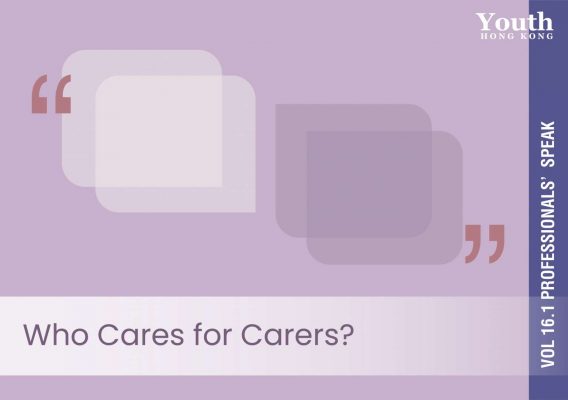//vol.16-1 Professionals Speak
Who Cares for Carers?
With a heavy workload, how do social workers and medical professionals take care of themselves and avoid burnout from work?
Cloud, social worker
As a school social worker, I provide mental support to adolescents with various mental disorders, including depression, anxiety, and impulsivity. With a weak supporting network around them and a lack of knowledge on mental health problems, students and parents rely on social workers when facing emotional breakdowns or communication challenges.
Teachers have high expectations for social workers, and with the comprehensive support needed for individual cases, the pressure on social workers also comes. Facing diverse cases that are continuously developing, I have to take on different responsibilities while dealing with stress and burnout. In reality, it is also highly taxing on the mind, leading to occurrences such as headaches, inexplicable muscle soreness, and muscle tension.
To cope with the pressure, I take self-care measures like eating comfort food, setting clear boundaries between work and personal life, unwinding through spa treatments, and carving out time for myself. Luckily, my boss is understanding and open to listening, and my family is supportive as well.
Sally, former school social worker
Secondary school is a challenge for most students. The pressures that they feel could be academic or personal, and quite often they feel the expectations of their parents, their teachers and even themselves weighing heavily on them.
I worked as a front line school social worker and my job was to try and provide an outlet for students who wanted to share their worries. Sometimes, students with more severe issues, would need to be referred to counsellors, psychologists or even psychiatrists. But I was very often the first person that they would talk to.
Caring for others is not easy, but I have a very strong belief in self-care too. For me, relaxation comes by watching dramas, series or movies on Netflix; cooking or taking my dogs for long walks. There is nothing like being totally distracted from my sometimes difficult job.
Sherman, former counsellor
I worked as a counsellor on the Open Up platform where my primary responsibility was listening to young people who wanted to share their emotional needs and concerns. There was not much reason to provide a solution to their challenges; all they wanted to do was talk to someone without worrying about being judged or criticised.
It was not always easy to listen to other people’s sorrows, sadness, anxieties and worries, every day for 8 hours a day, 3 days a week. When I felt tired, frustrated, hopeless or worried that I was beginning to burn out, I turned to my friends and colleagues. They were the only people I felt who could understand what I was feeling. You could say that this was my way of gaining the support that I needed to relax and be strong enough to face the next day.
Edith, clinical psychologist
As a mental health professional, I believe it is crucial to establish clear boundaries to prevent burnout and prioritise self-care. Just like caregivers, we must distinguish between our professional and personal selves, ensuring that we dedicate time and energy to nurturing our own well-being alongside our responsibilities.
Setting boundaries allows us to maintain empathy within our professional roles without carrying our clients』 emotions into our personal lives. This separation is essential for preserving our emotional well-being and preventing emotional exhaustion. In my clinical experiences, I have witnessed many individuals struggling to prioritise self-care due to a strong sense of responsibility towards others. However, neglecting our own needs can hinder our ability to provide effective care. It is important to recognize that self-care is not selfish but a necessary aspect of maintaining our overall well-being.
Personally, I find engaging in self-care activities essential. Ensuring sufficient quality sleep, maintaining a healthy diet, and fostering meaningful social connections are key components of my self-care routine. Additionally, I have found great value in pursuing hobbies, practising mindfulness, dancing, singing, or simply spending time watching TV as a means of replenishing my energy.
By balancing boundaries and prioritising self-care, I can sustain my ability to effectively nurture those clients in need. It is important for each mental health professional to explore and discover their own personalised self-care strategies that work best for them.


